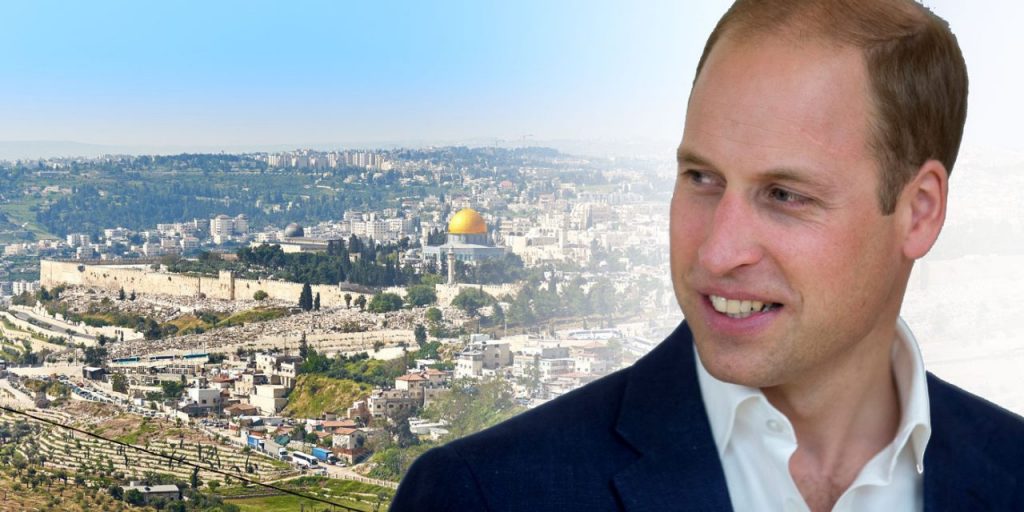Australia/Israel Review
Europa Europa: The final frontier
Apr 4, 2018 | Douglas Davis

Israelis do not hanker for a return to the days of the British Mandate. Nor do they hide secret reservoirs of nostalgia for the sometimes-brutal British colonial police who once strutted about their streets. But they did react with undisguised pleasure to the decision by the UK Foreign Office last month that the future king, Prince William, Duke of Cambridge, would this year make the first official visit to Israel by a senior member of the British royal family (he is unlikely to be accompanied by his wife, Catherine, who is expecting their third child in April).
For years, the “Camel Corps” at the Foreign Office, which decides where and when members of Britain’s royal family may travel abroad, has blocked invitations for an official royal visit to Israel, despite dozens of royal visits to other states in the region, including multiple trips to Libya, Iran, Sudan, Kuwait, Bahrain, Qatar, the United Arab Emirates, Oman, Saudi Arabia, Tunisia, Algeria, Morocco, Jordan and Turkey. The visit to Israel by a senior royal is the final frontier of the Jewish State’s diplomatic acceptance in the West.
True, Prince Charles, William’s father and heir to the throne, has made two brief “private visits” to Israel – to attend the funerals of former Israeli Prime Ministers Yitzhak Rabin (1995) and Shimon Peres (2016), while Prince Philip, the Queen’s husband and William’s grandfather, made a brief visit in 1994 to inspect the grave of his mother, Princess Alice of Battenberg, who was re-interred at the convent of St Mary Magdalene on the Mount of Olives in Jerusalem (Princess Alice was awarded the title of Righteous Among the Gentiles by Yad Vashem for having sheltered Jews in Nazi-occupied Greece).
But finally, after 70 years of resisting invitations for an “official” royal visit, projecting British “soft power”, the Foreign Office relented. Why? More appropriately: Why now?
First, because no British prime minister since Margaret Thatcher has been as well-disposed towards Israel as the current Prime Minister, Theresa May. It also helps that Foreign Secretary Boris Johnson still bears the happiest memories of the 12 months he spent as a volunteer on a kibbutz during his gap year between school and university.
Second, because Britain is leaving the European Union and needs to cement all its friendships, not least one with which it has important – and growing – economic ties (bilateral trade stood at US$10 billion last year, up 25 per cent over the previous year) and scientific partnerships (more than 1,000 Israeli and British scientists are currently involved in joint projects).
Third, because Israel is increasingly seen as a friend and trading partner among the traditionally hostile non-aligned states of Africa and Asia, as well as by a growing number of Arab states, not least in the Gulf. The Gulf states have turned a corner and are seeking to shake themselves free from dependence on oil and the Palestinian agenda, while implementing domestic reforms and dealing with the perceived threat posed by Iran’s nuclear ambitions and the threat of Shi’ite hegemony in the region.
Interestingly, the announcement of Prince William’s visit came on the eve of an official visit to Britain by Crown Prince Mohammed bin Salman, the power behind the Saudi throne. The fact that Salman’s visit continued without so much as a blip spoke volumes for the timing of the British decision.
The announcement of Prince William’s visit has been warmly received. In Jerusalem, Israel’s Prime Minister, Benjamin Netanyahu, described it as “historic”, adding that, “he will be welcomed here with great affection.”
And in London, Britain’s Foreign Office Minister for the Middle East, Alistair Burt, declared that it was an “important and unique opportunity to promote diplomatic and cultural ties in the region.”
British officials are stressing that the visit, like the royal family itself, will be strictly apolitical. Britain’s Ambassador to Israel David Quarrey said the visit would be about “the strength of the contemporary partnership and relationship between the UK and Israel. It won’t be a visit about the peace process or issues like that.” He hoped that the Prince would get to see something of Israel and meet “as many Israelis as possible,” adding he wanted the Prince to get “a flavour of this country.”
The visit by the Queen’s grandson, who is second in line to the British throne, is freighted with symbolic importance. It is a sign of ultimate legitimacy for Israel from its sternest critic in the West and a sign that the Jewish State is an important British ally, especially at a time of crisis over Brexit. It is a sign, too, from one of the most powerful players on the international stage, that Israel is neither shunned nor alone, in spite of the many military attempts to expunge it and political attempts to sanction it to death.
Seventy years after David Ben-Gurion, Israel’s first prime minister, proclaimed the birth of the new Jewish State, Britain has finally relented and played its ace. About time, some might say. More important, it is time to make up for lost time and, without the clapped-out inhibitions of the past, build a strong and durable alliance between Israel and Britain.
Tags: Israel, United Kingdom






